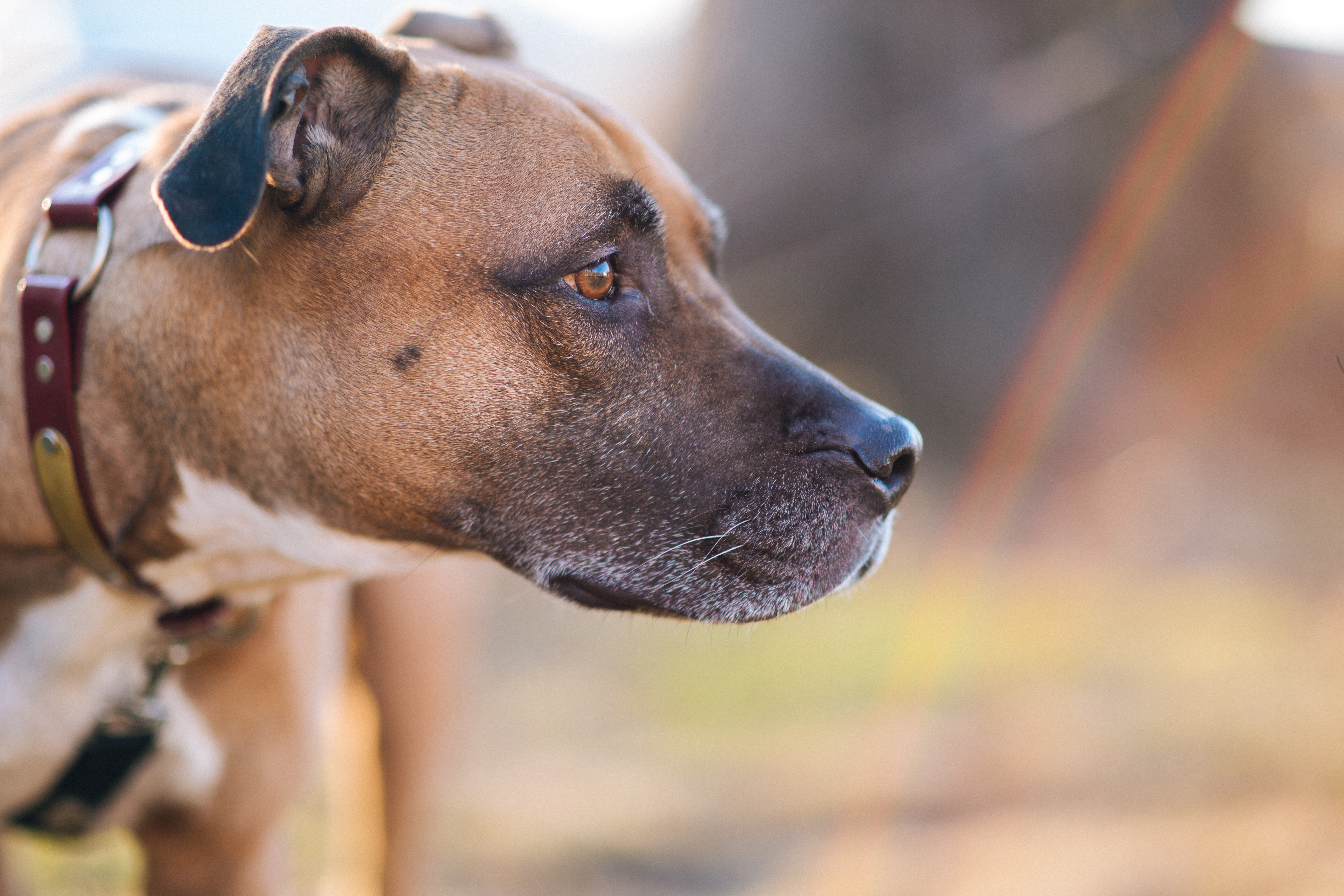Darlings, the wonderful Kimberly Artley is back on the blog today. In the past, she has helped us understand the importance of quality, nutritious food for our pooches and the significance that dog walks play in establishing a strong human and canine relationship. Today she tackles a very sensitive and emotional topic, “aggressive” behavior and how to “train” our dogs and us.

The above picture is a screen capture from the powerful Hungarian film, “The Gift”.
This story is what inspired this article.
An Emotional Topic
Now, this is a very sensitive and quite an emotional topic, and one we, as dog professionals, encounter quite frequently. In fact, just yesterday I had a conversation with 1/2 of a human dynamic re: their 10-year-old dog whose aggression has become a wedge in their relationship and life. One half wants to step up, train/educate/work with the dog through the issues (they’ve had him since he was a puppy), while the other would like to wipe hands clean by trying to re-home or end the dog’s life. I’ll also note, that this is also exactly how I ended up with my current foster dog, Sir Franklin (who’s doing amazing, by the way!).
This is something that really breaks my heart when it comes to dogs… or any animal that’s dependent on a human, for that matter; and while this isn’t what this particular article is about, it highlights the common denominator: the trauma dogs experience when left behind, given up on, re-homed, given away, etc. This is something I see so often when it comes to behavior, so I’d like to add to it.
Taking Responsibility
Taking on an animal, especially a social, pack species of animal-like us who thrives through bond and relationship, is taking on responsibility for their mental, emotional, and physical development and well-being. While dogs don’t emote in the same manner we do, they do emote. Loss, pain, grief, fear, anxiety, joy, excitement, overwhelm, nervousness, etc… they feel it all.
There are several reasons dogs are given up on. The most cited are:
Landlords not allowing pets, moving, cost of keeping, lack of training, illness of dog, illness of human, death of human, having no time, human developed allergies, divorce, break up of relationship, loss of job, too many animals in the home, and behavioral issues-which 99% of the time stem from lack of training and needs not being met and provided for.
Our Obligation As Owners
Having a dog is like having another child. They’re not born understanding the “ways of our world”. What we consider to be “appropriate”, “polite”, or “respectful” behavior. The onus 100% falls upon us to teach, guide, advocate, meet needs, and develop the various aspects of them (mental, physical, emotional) so they can live a wonderful quality of life. And also navigate, function, and participate in “life” and the “real world” with and alongside us. This is our obligation and responsibility.
Training The Human With The Dog
In the case of behavioral issues, it’s not just a matter of “training the dog”; but training the human with the dog. And if the human has children, training them, as well. Teaching both ends of the leash how to communicate, share space, and coexist respectfully so that relationship can develop, solidify, and all can experience the beauty that is sharing moments and days with a dog.
I don’t believe in “bad dogs”. I believe in mal-equipped, un-invested in, and misunderstood dogs. When it comes to “aggression” this is a phenomenon that is widely misunderstood, multiple factors feeding into it and multiples degrees and layers of it.
It’s also one of the most common behavioral issues dogs get bounced around turned into shelters, or – yes- euthanized. Sadly, what most people don’t realize, is that (outside of health/medical issues) it’s what they’re doing and not doing that greatly contributed to it.
Training Matters
As I always say and to paraphrase the great Maya Angelou, “We don’t know what we don’t know… until we do know. Then, when we do know, we can do better.” This is why training matters (and knowing the difference between “obedience training”, “behavioral training”, etc.; which develops very different aspects of the dog, and we need all).
There are very few people that are willing (or equipped enough to help/handle) to take on an “aggressive” dog. There are some rescues who might take the risk, but they are few and far between. It’s also important to note that rescues operate on foster availability, and are typically run by “dog lovers” (whose hearts are in the right place) vs. “dog understander-ers”.
There are a few rescues I know of who really equip and train their staff/volunteers to understand dog psychology, behavior, training principles, and techniques, etc, and to these folks–I bow in honor and deep reverence. Rescue work is also emotionally taxing, draining, and is very hard work. I do admire those putting themselves out there to aid animals in need. What they see, what they encounter… stays with them.
The Rescue Process
In any case, when a dog goes into rescue, there may be a foster available for one month, another for 3 months, another for 5 days, or maybe one for a year… and if there is no foster availability? The dog ends up at a boarding facility, or in a crate in a garage, or someplace until a foster is found… their needs really not being met. This lack of security, stability, need fulfillment, etc. will only exasperate and amplify existing behaviors (or even create some new ones).
It’s so very important, in my humble opinion, that anyone working with dogs in any way has a solid understanding of how to work with them. How to communicate effectively. What their needs are. How to troubleshoot and understand “behavior”. Mechanical skills and handling. And so on. AND have the wherewithal to be able to meet them, and also set up adopters for success (behaviorally speaking).
How We Can Help Rescues
Numbers are high and pressing, and these folks do all they can… but we can also help them by fulfilling our commitments to our existing dogs–meeting their needs, and equipping ourselves and getting the education on how to prevent, troubleshoot, manage, etc. That’s one of many ways we can help rescues…. by staying committed to our existing dogs and giving them an exceptional life. Working through problem areas and trouble spots with them, getting help when needed, connecting necessary dots, and helping them learn how to better understand and navigate “life”.
The whole point is this. I understand life can throw curveballs, but–if a dog is in your care–please take that responsibility seriously. Dogs are living, breathing, feeling, sentient beings, and they’re depending on us.
Do you have any dog-related questions for Kimberly? Leave them in the comments below!

Kimberly Artley is the Founder of PACKFIT: Dog Training and Behavior, author of the celebrated book, ‘My Dog, My Buddha’. She has been described as the “Mary Poppins” of dog training. Her experience stems from her game-changer dog Lobo. In addition, her background in nutrition, psychology, learning, and human/canine behavior blend seamlessly together. This allows Kimberly to take a comprehensive approach to successfully address a wide variety of canine behavioral challenges. As well, she just released 4 courses to help dog owners be at their best with their four-legged friends. Find them here: www.packfit.thinkific.com



My husband & I have a 4 yr old Anatolian Shepherd, female, weighing 120 lbs. My husband chose this not very well known breed for their longevity & health, having lost several dogs at an early age to cancer. Unfortunately he did not research their personality and needs. They are primarily a working/herding dog, and as we are in our 70’s, we don’t have a lot of work or herding for her to do. She is well behaved most of the time, but demands attention by growling, jumping, and snapping at our arms, especially my husband. His arms are constantly bruised and she has even drawn blood. We have been told by two different dog trainers that this is “play behavior” for this breed, but its not something we can participate in or tolerate. Saying ‘NO!” only seems to aggravate the situation.
Do you have ANY suggestions about how to handle this behavior? We know we made a mistake in choosing this breed, but we are not people who would give her away, or worse. Thank you for any advice you can give us.
Oh, Cindy: my heart goes out to you, and I commend you for reaching out on behalf of yourselves and your beloved dog.
I have several thoughts and insights based on the information you provided, and would love to share them with you. We conduct distance assessments and consultations (as well as distance training and coaching), but I’d love to connect with you about this. Our consultations are incredibly info-heavy, and I’m *most positive* I’ll be able to offer some invaluable tips you all can begin to employ immediately.
Dogs aren’t born understanding what we consider to be “polite”, “respectful”, “appropriate” behavior, and the onus truly falls upon us to teach them this. Learning how to communicate in a clear and effective manner is key, as well as addressing the other varying ingredients that are contributing to the behaviors and reality you’re living in.
I’d really love to shed light on all of this for you, as well as share with you how you can address it *effectively*.
Here is the direct link to the consultation. They’re conducted over the phone or via Zoom or FaceTime.
You can also reach out to me more directly here: kiimberly@packfit.net
Please trust me… there *is light* at the end of the tunnel! : )
Oh, Cindy: my heart goes out to you, and I commend you for reaching out on behalf of yourselves and your beloved dog.
I have several thoughts and insights based on the information you provided, and would love to share them with you. We conduct distance assessments and consultations (as well as distance training and coaching), but I’d love to connect with you about this. Our consultations are incredibly info-heavy, and I’m *most positive* I’ll be able to offer some invaluable tips you all can begin to employ immediately.
Dogs aren’t born understanding what we consider to be “polite”, “respectful”, “appropriate” behavior, and the onus truly falls upon us to teach them this. Learning how to communicate in a clear and effective manner is key, as well as addressing the other varying ingredients that are contributing to the behaviors and reality you’re living in.
I’d really love to shed light on all of this for you, as well as share with you how you can address it *effectively*.
Here is the direct link to the consultation. They’re conducted over the phone or via Zoom or FaceTime.
You can also reach out to me more directly here: kiimberly@packfit.net
Please trust me… there *is light* at the end of the tunnel! : )